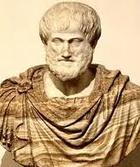
Callisthenes of Olynthus (Greek Καλλισθένης) (circa 360 BC. C.-328 a.), Greek historian of antiquity, nephew and pupil of Aristotle in Aso. He traveled with his uncle to the Macedonian court at Pella, following a request that Philip II did for Aristotle was the tutor of his son Alexander. There Callisthenes gradually adopted the Panhellenic ideal espoused the Macedonian king, based on leadership for Macedonia Hellas imposed on the threat posed by the Achaemenid Empire.
After the assassination of Philip, Callisthenes was recommended by Aristotle to be the personal historian of Alexander during his planned campaign against the Persian Empire. Callisthenes praised in his accounts the exploits of Alexander, picking the Macedonian king's claim to be the son of Zeus.
However, Callisthenes was one of the critics from the moment Alexander the Macedonian king decided to take the Persian ceremonial practices such as proskynesis of his subjects before him. This custom was oriental prostration kneeling and touching the ground with my head held this position before the king, as a token of devotion to the sovereign by divine nature. This practice was taken over by Alejandro poorly received by the Macedonians and the Greeks of his army and bureaucracy, including Callisthenes, who once offended the king prostrating before him had. This led to the downfall of the historian to Alexander, who later arrested the so-called conspiracy of the pages, Callisthenes accusing of being behind it. Callisthenes was arrested and imprisoned, because due to their status as Greek could not be prosecuted for a Macedonian court, dying in captivity either because of the torture, either by starvation. The sad end of Callisthenes was commemorated by his friend Theophrastus on a singular treatise (Callisthenes or a treatise on the pain), which came during a visit to Athens.
Along with chronicling the expedition of Alexander, Callisthenes also wrote several other works, such as the Hellenic, the history of Greece from Peace Antálcidas until the beginning of the Focea War (387-357 BC.) And List of winners of the Pythian games with his uncle Aristotle.
Illustration of The True Story of the life of the good King Alexander, the Pseudo-Callisthenes
A lot of legendary material was collected in ten volumes called Biographies of Alexander (also called novels of Alexander), the basis of all the legends about her figure in the Middle Ages. The final form of this text belongs to the third century, the author is generally known as Pseudo-Callisthenes, although the Latin translation made by Julio Alejandro Valerio Polemius (early fourth century) is attributed to a man named Aesop. Other characters that are attributed its authorship are Aristotle, Antisthenes, Onesícrates or Arrian.
Next to the Latin text several versions in Armenian, Slavonic, Syriac, Greek and four in the Middle Ages were made; the translation of Valerio was eventually replaced by that made Leon, Archbishop of Naples, in the tenth century, the so-called history Preliis .






